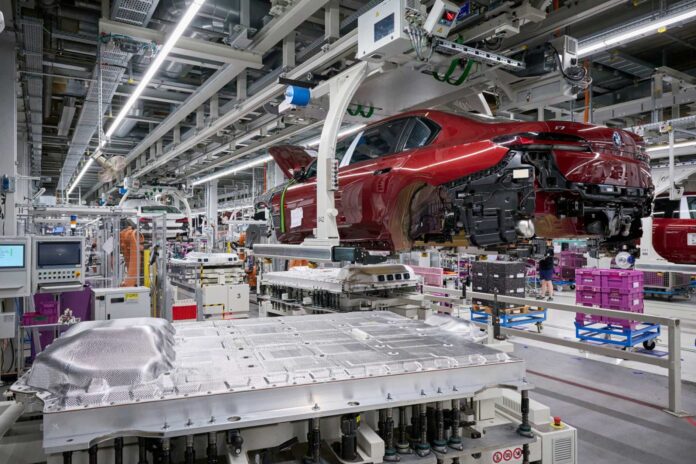Some new light on the murky, creeping digital change taking place in the automotive sector, long-considered the flashiest venue for Industry 4.0 (but highly secretive and deeply conservative), and specifically at one of its blue riband manufacturers, in the original home of Industrie 4.0; German car maker BMW has opened a new innovation hub (‘Innovation Hub’) at a training centre in Dingolfing, in Bavaria, in Germany, with NTT and Intel tapped to supply the connectivity-and-compute wares.
BMW has spent €600,000 on new private 5G connectivity and edge compute infrastructure in Dingolfing, which operates as a development and training centre for its 30-odd global manufacturing plants. Enterprise IoT Insights has covered BMW’s Dingolfing initiatives previously to automate outdoor ‘tugger trains’ to ferry vehicle parts around production plants, and trial a blockchain-based system to trace supplies, right down to critical raw materials, through its distribution chains.
The new work in Dingolfing has seen NTT and Intel equip “a secure development and testing area close to production” with sundry private-edge connectivity and computing capabilities. It does, therefore, equate to an isolated test implementation, away from live production, rather than a fully-fledged manufacturing system. It might be noted, BMW has private cellular setups elsewhere, and has invariably kept tabs on local 5G licensing provisions in Germany.
Deutsche Telekom has installed a dual-slice private LTE ‘campus network’, hived off its public LTE network, at a BMW plant in Leipzig. Ericsson supplied the networking gear. BMW’s joint venture in China, BBA, working with China Unicom and China Mobile, claims to be the first automaker to enable full 5G wireless coverage at all its plants. These projects constitute virtual private cellular networks, however, with the core networks sublet from national carriers.
The new network in Dingolfing, established at the end of last year, covers an area of 220 square metres. It is geared for development of “various use cases… under the same conditions as in the BMW production network but without having to interrupt actual vehicle production”. The new all-electric BMW i7 is currently being rolled off non-5G lines at Dingolfing. But a statement bills the new setup as a “real laboratory for testing future tech”.
It said: “[The site] is equipped with the same robots, facilities, access options, and systems as real production locations and thus functions as a small plant-within-a-plant… The aim is to transfer these technologies to the entire BMW production network worldwide after successful testing in Dingolfing.” Local NTT and Intel teams are engaged in co-creation to help develop and commercialise these “factory-of-the-future” applications.
The opening ceremony showed a “plant connection” to NTT’s private 5G network. Importantly, the new infrastructure will be made available to new recruits (“vocational trainees”) – so “key technologies of the 21st century can be experienced, learned, and taught to future generations of BMW employees”. The statement talked of some virtuous skills cycle where new recruits, with hands-on experience of 5G (/IoT/AI etc), further drive transformation at BMW.
“In this sense they are multipliers,” it said. “The apprentices receive important exposure to various IT fields and can quickly specialise in future fields relevant to BMW as part of their vocational training. In addition, new professions in the field of IT will be offered in the future, including IT systems electronics technicians and IT specialists.”
Milan Nedeljković, board member for production at BMW, said: “Digitalization… shapes all our manufacturing processes and helps us produce products more economically, sustainably, in a more customer-oriented manner, and with higher quality. The Innovation Hub is the ideal place for ideas to become reality… Bringing together the know-how and expertise of different partners to develop clever and effective solutions is a decisive factor.”
Ralf Gebhart, senior vice president and global account executive for BMW at NTT, said: “The factory of the future will be digital and hyper-connected, and edge-to-cloud connectivity as well as [private 5G] will play a crucial role in this. 5G will unfold into the ‘nervous system’ of modern industry. NTT is very pleased to be part of [this] and jointly shape innovative concepts for the future of the automotive industry here at the Dingolfing site.”
Hannes Schwaderer, country manager of Intel in Germany, said: “In the context of digital transformation, the modern professional world requires more and more technological skills, particularly from the specialists of the future. Preparing them for this is a concern that we at Intel have been addressing for a long time by working intensively on the digitization of education. We are, therefore, very excited about the collaboration in the Innovation Hub.”

